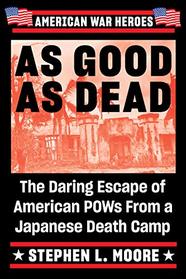The death toll for civilians in the Pacific and Asian theaters of World War II equals, if not surpasses, that of the European theater and the Nazi atrocities. Many may find that statement hard to believe, but it is true. The Japanese were even brutal to people who actually cooperated with them.
So you can surmise what the Japanese did to POWs. It is a documented fact that Allied POWs in German camps returned with numerous souvenirs they made while captured. Allied POWs of the Japanese didn't, as they wanted nothing to remind them of their experiences.
As such, this is a very difficult book to read. What the Japanese did to Filipino and American soldiers on the Bataan Death March and in the prison camps is well documented. And the author describes it here in detail. Despite having read many other books about this, I still found it hard to understand how the prisoners could endure they happened to them and retained their will to survive. Of course, many could not and died quickly. Those who survived were the toughest. How a man could take several bullets and bayonet wounds in him and still swim miles to safety is a testament to their spirit for survival. And we must not overlook the Filipino people who fought along side them or led them to safety and paid heavily for it. One out of every 20 Filipinos died during the Japanese occupation, often brutally. For example. on the Bataan Death March the Japanese murdered hundreds of American soldiers, but the Filipino soldiers were killed by the thousands.
But it was disappointing how many of these terrible atrocities went unpunished or how some war criminals received lenient sentences. While not described in the book, there were Japanese soldiers and civilians who perpetrated unbelievable acts on POWs---for example, dissecting, living POWs for study or testing biological warfare methods on them---who later went on to become wealthy "captains of industry" in post-World War II Japan. This was partially due to Douglas MacArthur's desire to have the Japanese people love him in his role as post-war governor of Japan. Yet, MacArthur made sure Japanese General Homma paid with his life after what historians call a show trial, simply because Homma made the mistake of beating MacArthur in the Japanese conquest of the Philippines.
So you can surmise what the Japanese did to POWs. It is a documented fact that Allied POWs in German camps returned with numerous souvenirs they made while captured. Allied POWs of the Japanese didn't, as they wanted nothing to remind them of their experiences.
As such, this is a very difficult book to read. What the Japanese did to Filipino and American soldiers on the Bataan Death March and in the prison camps is well documented. And the author describes it here in detail. Despite having read many other books about this, I still found it hard to understand how the prisoners could endure they happened to them and retained their will to survive. Of course, many could not and died quickly. Those who survived were the toughest. How a man could take several bullets and bayonet wounds in him and still swim miles to safety is a testament to their spirit for survival. And we must not overlook the Filipino people who fought along side them or led them to safety and paid heavily for it. One out of every 20 Filipinos died during the Japanese occupation, often brutally. For example. on the Bataan Death March the Japanese murdered hundreds of American soldiers, but the Filipino soldiers were killed by the thousands.
But it was disappointing how many of these terrible atrocities went unpunished or how some war criminals received lenient sentences. While not described in the book, there were Japanese soldiers and civilians who perpetrated unbelievable acts on POWs---for example, dissecting, living POWs for study or testing biological warfare methods on them---who later went on to become wealthy "captains of industry" in post-World War II Japan. This was partially due to Douglas MacArthur's desire to have the Japanese people love him in his role as post-war governor of Japan. Yet, MacArthur made sure Japanese General Homma paid with his life after what historians call a show trial, simply because Homma made the mistake of beating MacArthur in the Japanese conquest of the Philippines.




